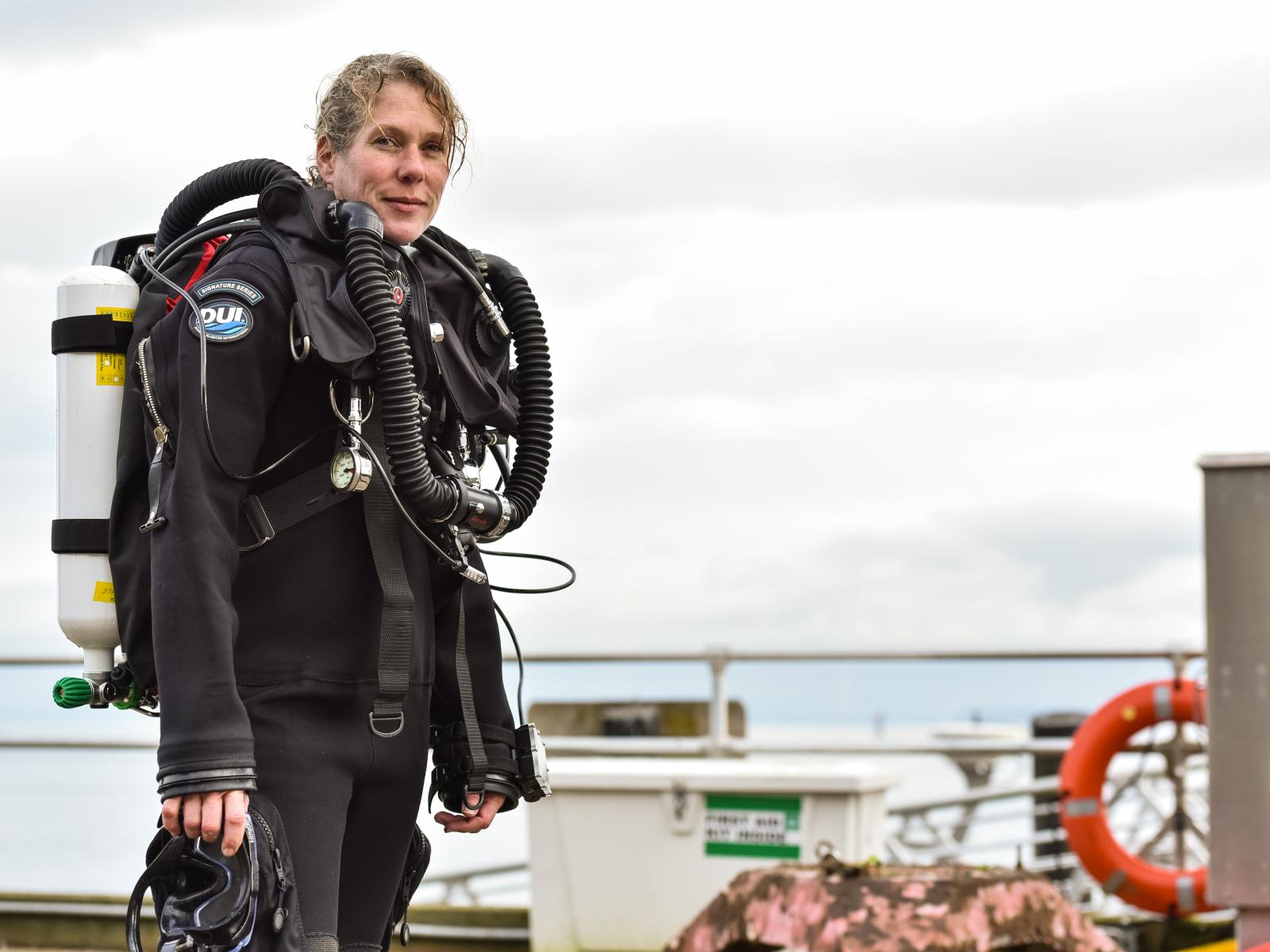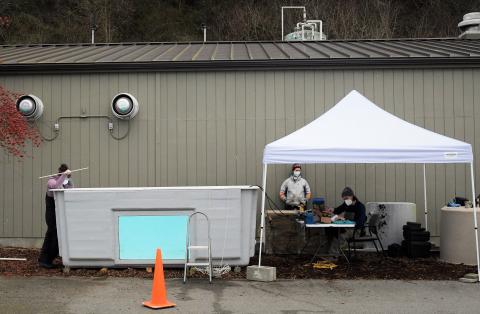Safety First! How Triton Conducts Field Operations Safely with Sue Southard

Sue Southard
Photo by Andrea Starr | Pacific Northwest National Laboratory
The Department of Energy Water Power Technologies Office’s Triton Initiative is a project working hard to support the marine energy industry through environmental monitoring in order to remove barriers to deployment. One of the most important aspects of this marine energy research is conducting fieldwork. While the Triton team is testing sensors, deploying equipment offshore, or monitoring underwater noise around a tidal turbine, safety is always the highest priority.
As the Triton team plans for upcoming field operations in diverse environments, there is a lot of planning that goes on behind the scenes to ensure everyone involved is safe and prepared if unexpected circumstances arise in the field. Additionally, implementing health and safety protocols is more important than ever when conducting research during a pandemic. One of the people helping the Triton team prepare and review safety protocols for the upcoming field trials is Pacific Northwest National Laboratory’s (PNNL’s) Marine Coastal Research Laboratory’s (MCRL’s) operations specialist and research diver, Sue Southard.
Southard has been with PNNL for over 25 years, serving diverse projects and taking on multiple roles. Southard has a background in fish passage research. Her career began at PNNL’s Richland campus, researching how fish navigate rivers, dams, and irrigation canal systems. When the work became looking at dots on a computer screen that represented fish instead of working with real animals in the water, it led her to PNNL’s MCRL, located at the entrance to Sequim Bay on Washington’s Olympic Peninsula. Southard quickly found herself on the water, seining for fish and diving as part of MCRL’s scientific dive team. Over time, Southard’s career path shifted toward administrative functions—she now serves as associate operations manager for MCRL. Her responsibilities in this role are centered around safe and environmentally compliant conduct of lab operations, indoors and out. She is responsible for training, environmental protection, safety, security planning, operational reviews, and audits. She also helps coordinate field projects for diverse clients that make use of MCRL expertise, facilities, and equipment that require complex environmental permitting and safety training. Knowing firsthand the risks associated with diving operations and on-water field deployments, Southard is able to draw from her decades of experience to help plan for unexpected obstacles and ensure safety measures are in place before anyone steps on a boat or dives under water.
Since the Initiative’s very beginning, Southard has personally supported Triton by participating in project planning, diving, and operating boats. She has helped secure electric cables to the seafloor to test electromagnetic field detection equipment, acted as a diver target for the BioSonics detection systems, and has installed complicated hydrophone arrays underwater, all for Triton's work with DOE-funded technology development projects (funding opportunity announcement projects). But Southard’s support for Triton is more than just diving, she has also helped permit sites for testing, coordinate vessels, and equipment, and ensure all staff are properly trained before conducting their research.
Prior to starting a project, PNNL safety staff work with Triton’s team members to perform an evaluation of potential project risks. First, they examine the level of risks and hazards associated with the project tasks. Then they determine how best to mitigate and reduce any risks to staff. This level of preparation moves the project along safely, but also provides the opportunity to mitigate risk to the project timeline and reduces damage to expensive laboratory equipment if not operated properly. "When we identify a potential hazard early in the review process, we are almost always able to find a way to significantly reduce—and sometimes even to eliminate—the risk," says Southard. This culture of safety at PNNL is very strong, ensuring staff have a healthy respect for what can go wrong and the confidence to speak up when risks may be present.
“I like seeing science come to life and knowing that I am playing at least a small role in helping new technologies become a reality,” says Southard. She adds, “[our researchers] are thinking about real-world problems involving power generation and energy storage, and how to solve our energy needs while simultaneously protecting our ocean environment. That’s exciting to be a part of.” The team is passionate about achieving its mission to progress the marine energy industry while maintaining high scientific and safety standards. Safety may not be the most exciting part of science, but it is the most important.
Southard offers a piece of advice: pre-planning and great communications are the keys to success.
To prepare as much as possible, the Triton team has been running tests on equipment in tanks at MCRL to get ready for the Triton Field Trials (TFiT) deployments. TFiT works toward advancing knowledge around the impacts of marine energy devices by providing recommendations for procedures and technologies used to monitor specific stressors associated with marine energy systems, including underwater noise, changes in habitat, electromagnetic fields, and collision risk. The team will be conducting in-water deployments of monitoring technologies at various test sites around the United States this spring and summer to assess the four stressors. Changes in habitat lead, Lenaig Hemery, and collision risk lead, Garrett Staines, are currently conducting tank tests on equipment they’ll be using during the field trials. These tests allow the researchers to acquaint themselves with the equipment, practice deploying the instruments, and troubleshoot any issues in a controlled environment. These pre-field tests help the team prepare to work together and ensures the technology is calibrated and the methodologies to collect data are finalized before heading to the field.
Tank tests are one of many ways the Triton team is ensuring safety for its researchers. Triton has been preparing extensive health and safety plans, coordinating travel protocols, purchasing important personal protective equipment, and communicating every detail of the work to ensure everyone is protected from COVID-19 and prepared to conduct safe fieldwork. In all safety briefings and training courses, PNNL emphasizes the importance of the “Stop Work” policy. All staff at PNNL are empowered to announce a stop of work any time they see something unsafe or do not feel comfortable with a task. The lab has built a safety culture where staff look out for themselves and for one another. Project manager Alicia Amerson explains, “We have an amazing team we care a lot about, so it is important to us that everyone feels safe and comfortable with the work we are doing.” By taking all these precautions, the Triton field team is setting itself up for success to collect data necessary to help remove barriers to testing marine energy devices.

Written by Cailene Gunn.
Subscribe to our monthly newsletter here.
Published: March 2, 2021